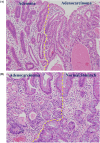Clinical implications of pre-existing adenoma in endoscopically resected early gastric cancers
- PMID: 28542582
- PMCID: PMC5444828
- DOI: 10.1371/journal.pone.0178419
Clinical implications of pre-existing adenoma in endoscopically resected early gastric cancers
Abstract
Background: Although gastric adenoma is widely accepted as a precursor of gastric cancer, pre-existing adenoma is not always detected in gastric cancer patients.
Objective: To investigate the clinical characteristics of early gastric cancer (EGC) arising from adenoma, compared with those of EGC without pre-existing adenoma.
Methods: Patients who underwent endoscopic resection for EGC at a single tertiary hospital were divided into two groups based on the presence (ex-adenoma group) or absence (de novo group) of pre-existing adenoma on pathologic specimens. Clinicopathologic characteristics, endoscopic features and long-term outcomes were analyzed.
Results: Of 1,509 patients, 236 (15.6%) were included in the ex-adenoma group. Mean age (P = 0.003) and Helicobacter pylori infection rate (P = 0.040) were significantly higher in the ex-adenoma than in the de novo group. Mean endoscopic size was significantly larger, elevated lesions were more prevalent (both P < 0.001), and carcinomas were more differentiated in the ex-adenoma group than in the de novo group (P = 0.037). The degree of atrophy (P = 0.025) or intestinal metaplasia (P < 0.001) was more advanced in the ex-adenoma group. Synchronous gastric neoplasia was significantly more prevalent in the ex-adenoma group (P < 0.001), whereas metachronous cancer recurrence rate was not significantly different between the two groups.
Conclusions: EGCs with pre-existing adenoma show a greater association with H. pylori-related chronic inflammation than those without, which could explain the differences in the characteristics between groups. Potential differences in carcinogenic mechanisms between the groups were explored.
Conflict of interest statement
Figures



Similar articles
-
Gastric epithelial dysplasia: characteristics and long-term follow-up results after endoscopic resection according to morphological categorization.BMC Gastroenterol. 2015 Feb 12;15:17. doi: 10.1186/s12876-015-0249-7. BMC Gastroenterol. 2015. PMID: 25886985 Free PMC article.
-
Endoscopic and clinicopathologic characteristics of early gastric cancer with high microsatellite instability.World J Gastroenterol. 2012 Jul 21;18(27):3571-7. doi: 10.3748/wjg.v18.i27.3571. World J Gastroenterol. 2012. PMID: 22826622 Free PMC article.
-
Undifferentiated histology after endoscopic resection may predict synchronous and metachronous occurrence of early gastric cancer.Digestion. 2010;81(1):35-42. doi: 10.1159/000235921. Epub 2009 Dec 22. Digestion. 2010. PMID: 20029207
-
[High-grade gastric intra-epithelial neoplasia (or dysplasia) treated by endoscopic mucosal resection].Ann Pathol. 2011 Oct;31(5):375-80. doi: 10.1016/j.annpat.2011.07.006. Epub 2011 Sep 28. Ann Pathol. 2011. PMID: 21982245 Review. French. No abstract available.
-
Optimal Surveillance of Metachronous Gastric Lesion after Endoscopic Resection of Early Gastric Cancer.Gut Liver. 2024 Sep 15;18(5):781-788. doi: 10.5009/gnl240027. Epub 2024 Aug 8. Gut Liver. 2024. PMID: 39114875 Free PMC article. Review.
Cited by
-
Health expenditure trajectory and gastric cancer incidence in the National Health Insurance Senior Cohort: a nested case-control study.BMC Health Serv Res. 2024 Sep 16;24(1):1076. doi: 10.1186/s12913-024-11494-y. BMC Health Serv Res. 2024. PMID: 39285469 Free PMC article.
-
Endoscopic Resection of Gastric Cancer Caused by Adenoma.Gut Liver. 2018 May 15;12(3):219-220. doi: 10.5009/gnl18161. Gut Liver. 2018. PMID: 29724085 Free PMC article. No abstract available.
-
Clinicopathologic Characteristics and Long-Term Outcome of Gastric Cancer Patients with Family History: Seven-Year Follow-Up Study for Korean Health Check-Up Subjects.Gastroenterol Res Pract. 2020 Oct 22;2020:4028136. doi: 10.1155/2020/4028136. eCollection 2020. Gastroenterol Res Pract. 2020. PMID: 33144855 Free PMC article.
References
-
- Parkin DM, Bray F, Ferlay J, Pisani P. Global cancer statistics, 2002. CA Cancer J Clin. 2005;55(2):74–108. - PubMed
-
- Correa P. Human gastric carcinogenesis: a multistep and multifactorial process—First American Cancer Society Award Lecture on Cancer Epidemiology and Prevention. Cancer Res. 1992;52(24):6735–40. - PubMed
MeSH terms
Supplementary concepts
LinkOut - more resources
Full Text Sources
Other Literature Sources
Medical

